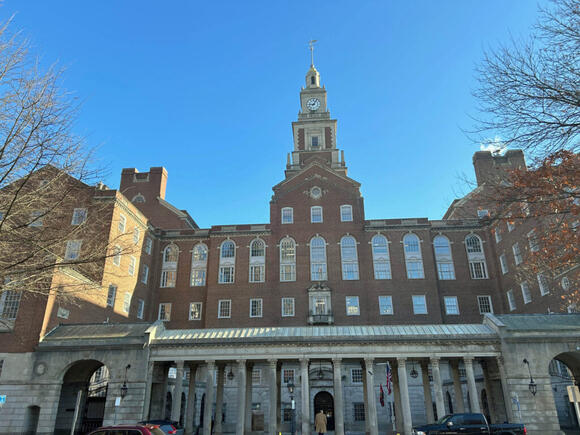
The Licht Judicial Complex in Providence houses the Rhode Island Supreme Court and Providence/Bristol County Superior Court. (Nancy Lavin/Rhode Island Current)
The namesake of a 2021 state law that gives offenders convicted before their 22nd birthday the chance for parole can now seek a hearing for his own possible release after serving over 20 years in prison.
The Rhode Island Supreme Court ruled 4-1 Tuesday that 40-year-old Mario Monteiro, along with three other offenders convicted of crimes during their youth, have the right to a parole hearing under the Youthful Offenders Act , also called “Mario’s Law.”
Monday’s decision came over a year after Superior Court Justice Stephen Nugent ruled that Monteiro should immediately be released on parole due to his rehabilitation efforts. That ruling was appealed by the Rhode Island Office of Attorney General, which argued Mario’s Law did not apply to Monteiro. State prosecutors argued the law only applies to those sentenced for “any” offense, not offenders serving life sentences for multiple crimes.
Monteiro was convicted in 2002 for a murder he committed at the age of 17 in 2001. He was sentenced to life on the murder charge and a mandatory consecutive life sentence for discharging a firearm during a days-long gang feud that resulted in the death of 31-year-old Cambodian immigrant Rom Pov.
Monteiro was unanimously granted parole for his first life sentence in 2022, but not for his second conviction.
Rhode Island Supreme Court Justice Maureen McKenna Goldberg dismissed the state’s arguments, writing that the 2021 law mandates the aggregation of an offender’s sentences, including consecutive sentences.
“While the state attributes great importance to the singular usage of the term ‘offense,’ we conclude that this emphasis is misplaced,” Goldberg wrote.
The court also found that Nugent overstepped his authority when he ordered the parole board to immediately release Monteiro. That same argument applied to a 2022 ruling by Nugent to release Pablo Ortega, Joao Neves and Keith Nunes — all of whom the state had similarly argued were not eligible for parole.
In his lone dissent, Justice William Robinson concluded that “any offense” does indeed mean any single offense and that the defendants were ineligible for parole because they were convicted of multiple offenses.
“If the General Assembly had deliberately opted to exercise legislative grace towards youthful offenders serving sentences for having committed multiple offenses, it would have been a straightforward and easy task to draft statutory language that would make reference to a youthful offender sentenced to ‘any offense or offenses,’” Robinson wrote.
The court’s ruling was meant to provide clarity for the state, observed Roger Williams University School of Law Professor Michael Yelnosky.
“A core function of the highest court in a state is to issue controlling interpretations of statutes when the meaning of those statutes is not crystal clear,” Yelnosky said in an email to Rhode Island Current.
The Rhode Island chapter of the American Civil Liberties Union called the court’s ruling “a major victory for criminal justice reform.”
“The science supports the position that juveniles and young adults do not have the same impulse control that adults do,” Sonja Deyoe, one of the attorneys representing Monteiro, said in a statement Tuesday.
“Accordingly, if they can prove they are rehabilitated, it makes sense to parole these now adult men and women to the community.”
Brian Hodge, a spokesperson for the Attorney General’s office, acknowledged a request for comment on the ruling but did not send a response.
Correction: This story has been updated to correct the day of the court’s decision.
GET THE MORNING HEADLINES DELIVERED TO YOUR INBOX
The post R.I. Supreme Court rules ‘Mario’s Law’ namesake can seek parole appeared first on Rhode Island Current .
 Most Popular
Most Popular

Comments / 0